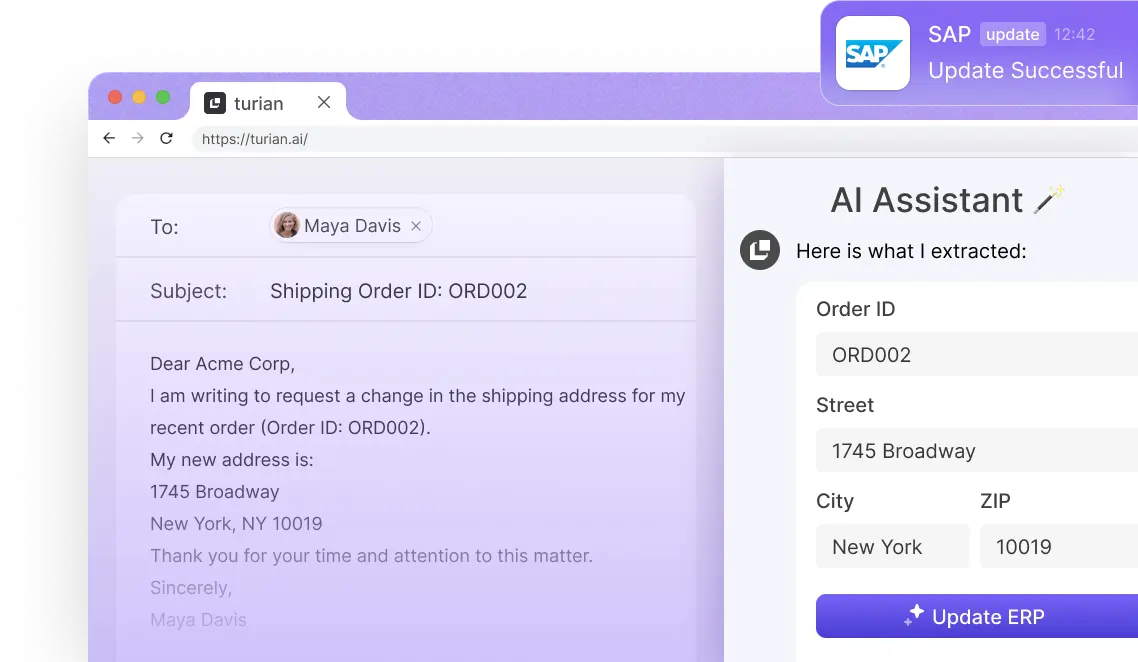

How AI is Tackling Common Order Processing Challenges
In a world where speed & efficiency can mean the difference between success and stagnation, optimizing your business operations is crucial. Whether you're in procurement, sales, or customer service, the way you handle your orders can either propel your business forward or hold it back. But let's be practical- order processing can be a tiresome and protracted task.
It involves a bunch of repetitive tasks like data entry, validation, quoting, and more, which can take up a significant amount of your team's time. It's like doing the same thing over and over again without any room for innovation or improvement. But it doesn't have to be this way. In today's digital age, where technology is advancing at an astonishing pace, Artificial Intelligence (AI) has emerged as a game-changer for order processing. It not only automates these mundane tasks but also provides valuable insights for improving your business operations.
In this blog post, we'll take a look at what AI is, how it tackles common order processing challenges, and what benefits it brings to your business. By the end, you'll have a solid understanding of how AI can transform your order processing and help your business thrive.
What is AI? How Does It Work?

Image Credit: Freepik
Artificial Intelligence (AI) is a broad term that refers to the development of intelligent machines that can perform human-like tasks with minimal or no human intervention. It encompasses a wide range of smart technologies, including machine learning (ML), natural language processing (NLP), and robotics, to create intelligent systems that can understand, learn, and adapt.
However, at the core of AI, especially for sales order intakes, is a specific type of technology called Large Language Models (LLMs). These machine-learning models are trained on massive datasets, which allows them to understand, generate, and manipulate human language in a sophisticated manner. LLMs can interpret and extract data from emails and attachments, understand context and intent, and generate accurate responses.
They can also be fine-tuned for specific tasks, which makes them versatile and adaptable to different industries. LLMs consist of several key components that coordinate requests and generate responses to prompts. Below are the 5 primary components of LLMs:

- Embedding Layer: This layer maps input tokens, which are words or subwords, and grabs the semantic connections between words to improve contextual understanding.
- Feedforward Layer: The feedforward layer processes the tokens from the embedding layer to pinpoint patterns and relationships in the data, enhancing the LLMs' ability to learn.
- Recurrent Layer: This layer captures sequential dependencies and allows the model to consider previous tokens in a sequence, making it suitable for tasks where context and order matter.
- Attention Mechanism: The attention mechanism aids the LLM to concentrate on specific segments of the input with varying importance. This improves the model's ability to comprehend connections and context, especially for long inputs.
- Neural Network Layers: These layers process information and pass it to the next layer, forming a deep neural network. This architecture allows the LLM to generate human-like text and understand complex data sets.
In simple terms, LLMs work by processing huge amounts of text data, learning patterns and relationships, and generating human-like responses to prompts. This makes them an excellent tool for automating tasks that involve text and communication, such as sales order intakes. The best part is that they can constantly learn and improve; the more data they receive, the better they become.
Common Order Processing Challenges: How AI is Tackling Them

Image Credit: Freepik
Order processing is the lifeblood of any business. It's the backbone that keeps the whole operation running smoothly. It is a link between the customer demands and the business's ability to fulfill them. However, this critical process is not as simple as it may seem. It involves a series of tasks that require time, effort, and careful attention to detail. When done in a traditional manual manner, order processing can be plagued with several challenges that can hinder your business's growth. Below, we've listed some of the most common order-processing challenges that can hold your business back and how AI can tackle them effectively.
Manual Data Entry and Validation
One of the biggest and most time-eating tasks in order processing is manual data entry. It involves transferring data from various sources (like emails or CSVs) into the ERP system. Your supply chain sales team may spend hundreds of hours entering customer information, order details, and invoicing data. Now, this not only eats up your team's valuable time but also opens the door for other challenges, such as:
- Higher error rate (typos, incorrect data, or missing information)
- Inconsistency in data entry
- Delays in processing orders
Moreover, the validation of this manually entered data adds another layer of complexity and time consumption. Each piece of information must be cross-checked for accuracy, completeness, and consistency to avoid errors and ensure smooth order processing. For example, you might know the pain of matching the correct product that your client ordered (but forgot to mention the product ID) with your own product database. This data extraction and validation process is essential but tremendously tedious. Even a small mistake can have consequences on your business's efficiency, customer satisfaction, and bottom line.
How AI Can Tackle This Challenge:
AI-powered order processing eliminates the need for manual data entry by using Large Language Models (LLMs) to read, interpret, and extract information from emails and attachments. These intelligent systems can understand context and customer intent, ensuring accurate data transfer without any errors or delays. AI assistants can also compare and validate the extracted data with your existing systems, saving you time and effort in the validation process. They can also update records in real-time, which means you don't have to wait for your team to manually enter data and validate it. This streamlines the order processing workflow, reduces errors, and frees up your team's time to focus on more critical tasks.
Managing High Order Volumes
Effective order processing is crucial for optimizing inventory levels, delivering products on time, and meeting customer preferences. However, if your business is faced with a sudden spike in orders, it can quickly become overwhelming for your team to handle manually. This can lead to delays in processing orders, causing a domino effect on your entire supply chain operations. Without proper handling, your business cannot scale up or meet consumer demand. If you're thinking about hiring more employees to handle the increased volume, it's not a sustainable solution. Not only will it increase your overhead cost, but human error and fatigue can still cause delays and errors in the process.
How AI Can Tackle This Challenge:
An automated order processing system is designed to help scale your business without adding more manpower. Whether your business receives 100 or 1000 orders in a day, AI-powered assistants can handle them with ease and speed. It can process orders 24/7, without any breaks or delays, ensuring that your business meets customer demand and maintains a seamless supply chain. This also means that you don't have to worry about hiring more employees or investing in expensive infrastructure to handle high order volumes.
Lack of Real-time Updates
For any business, having a clear picture of its order process is crucial for making data-driven decisions. However, when orders are processed manually, it can be challenging to track and monitor their progress in real-time. This is because the data is spread across different systems and often requires manual updates, making it difficult to have an accurate and timely view of your orders. We have seen many companies building Excel-sheets where they manually pull information from many systems to maintain an overview. Needless to say that this is neither a stable nor an efficient solution. A lack of real-time oversight can lead to issues like stockouts, inaccurate demand forecasting, poor inventory management, and delayed deliveries.
How AI Can Tackle This Challenge:
By using machine learning, and data visualization techniques, AI order processing systems can analyze historical sales data, market trends, and customer behavior to provide real-time insights into your order processing. They can track orders from the moment they are received to the time they are delivered, giving you complete visibility and control over your supply chain operations. This real-time tracking and monitoring not only helps with decision-making but also allows you to identify bottlenecks and delays in the process so you can take corrective action immediately.
Compliance and Regulatory Requirements
Order processing also involves compliance with various regulations, such as industry standards, trade policies, environmental reporting, and data protection laws. Ensuring that your business adheres to these regulations is crucial to avoid legal penalties, maintain customer trust, and uphold your company's reputation. Manual processing of orders often makes it challenging to consistently meet these regulatory requirements. The process requires meticulous attention to detail and constant updates to stay abreast of evolving regulations, which can be time-consuming and prone to errors. Plus, with the increasing complexity of regulatory requirements, keeping up with compliance can be an overwhelming task for any business. Most SMEs simply don’t have the capacity to fulfill their legal compliance duty with full diligence, exposing themselves to hefty legal fines.
How AI Can Tackle This Challenge:
With AI order processing, you can focus on your core business while ensuring compliance with all regulatory requirements. By leveraging LLMs that can be integrated into your databases, AI order processing systems can evaluate your orders against various regulations like CSDDD, CBAM, and REACH/RoHS. They can also automatically flag any potential non-compliances or discrepancies in the order and your product base, allowing you to take corrective action before it becomes a compliance issue. This not only saves time and effort but also gives you peace of mind, knowing that your business is complying with all necessary regulations.
Poor Customer Experience
Delivering a superior customer experience is crucial for any business to thrive in the market. It not only helps attract and retain customers but also promotes brand loyalty and positive word-of-mouth. While manual order processing may add a personal touch, it comes with its own set of challenges that can negatively impact the customer experience. These can include:
- Long wait times
- Inaccurate order fulfillment
- Lack of transparency in the process
- Limited communication channels
- Difficulty in order tracking and updates
How AI Can Tackle This Challenge:
AI is not just great for analyzing historical sales data or processing orders, but it can also enhance the overall customer experience. By automating repetitive tasks, AI can reduce errors, shorten wait times, and provide real-time data and updates to customers. Some top-class AI order processing systems (like turian) also come with communication features that can handle customer queries and concerns in real-time. This AI assistant can draft responses, generate quotes, and even request additional information, all while keeping the customer in the loop. From supply chain management to logistics, it helps you provide a seamless and hassle-free customer experience.
Beyond these challenges, order processing also involves complex tasks like fraud detection, payment processing, supplier management, and more. With AI, businesses can streamline their entire order-processing operations. This not only helps improve efficiency and productivity but also allows businesses to focus on their core competencies and drive growth.
How turian Can Help Streamline Your Order Processing

Image Credit: Aleksandarlittlewolf
Traditional methods to process orders are tedious, time-consuming, and prone to errors. Why? Well, these methods rely heavily on human intervention, which comes with its own set of limitations, such as inefficiency, inaccuracy, and delays. If you're struggling to manage your sales order intake and looking for a better, smarter, and more efficient way to process orders, then turian is just the solution for you. Our AI-based order processing assistant leverages the power of Large Language Models (LLMs) to provide quick, accurate, and efficient order processing, all while saving you time and resources. Here's how Turian can help streamline your order processing:

- Automate Data Entry: With turian, you don't have to manually enter data or copy and paste information from one system to another. Our AI assistant can extract relevant data from emails and attachments and automatically update your ERP or CRM systems in real-time.
- Improve Efficiency, Accuracy, and Speed: Our AI assistant has human-level understanding, which means it can accurately process and understand complex data, including emails and attachments. It can help eliminate 80% of your team's admin work and save hundreds of hours that can now be utilized for more strategic and value-adding tasks.
- Seamless Integration: turian seamlessly integrates with popular email clients like Gmail and Outlook and can also be integrated with your existing ERP or CRM systems. You can easily connect the tools you already use, like Salesforce, Hubspot, SAP, and more.
- AI-generated Smart Replies: turian not only offers built-in data security and compliance features, but it also can generate tailored responses with a single click, including attachments. Our AI can draft responses, generate quotes, and request additional information from suppliers.
- Real-time Updates: With turian, you can access real-time updates and data from your ERP or CRM systems right next to the email inbox. This means you'll always have the most up-to-date information without switching back and forth between different platforms.
Simply put, turian is designed to streamline your order processing and empower your B2B operations. It can handle an assortment of tasks, from managing POs and delivery updates to automating supplier emails with compliance information. If you want to experience the efficiency and power of our AI assistant, book a demo today and see for yourself how turian can streamline and optimize your order processing.
{{cta-block-blog}}

Say hi to your
AI Assistant!


Lernen Sie Ihren KI-Assistenten kennen!
.avif)
FAQ
AI can solve order processing problems by automating various tasks like data entry, validation, quote generation, order tracking, and more. It can reduce human errors, shorten wait times, improve accuracy, and streamline the entire order processing workflow. It's like a smart assistant that works 24/7 without any breaks, allowing businesses to focus on more strategic tasks like driving growth and enhancing customer experience.
Yes, AI can handle large volumes of orders with ease. It has the ability to process and understand complex data quickly and accurately. Whether you have hundreds or thousands of orders, AI can easily handle massive amounts of orders without worrying about delays, errors, or quality issues. It also eliminates the need to hire additional staff during peak seasons, saving time and resources.
There are various AI technologies used in order processing, such as natural language processing (NLP), machine learning (ML), and computer vision. However, advanced AI-based order processing systems (like Turian) use Large Language Models (LLMs) to provide a more comprehensive understanding of data.
Absolutely! With AI, tracking orders in real-time is not only possible but also much more efficient and accurate compared to traditional methods. AI can analyze data and provide real-time updates on order status, delivery timelines, and other relevant information. This allows businesses to make informed decisions based on the most up-to-date data analysis, improving overall efficiency and customer satisfaction.





